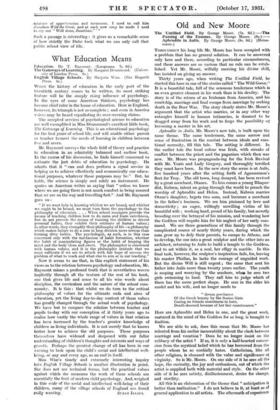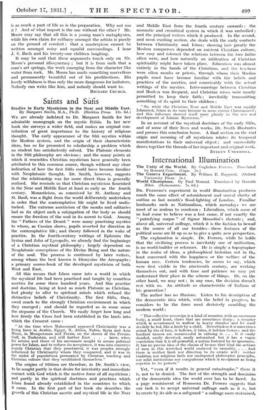Old and New Moore
TuaouGnotrr his long life Mr. Moore has been occupied with a problem that has no general solution. It can be answered only here and there, according to particular circumstances, and these answers are so various that no rule can be estab- lished. Yet Mr. Moore, wilfully coercing his divine skill, has insisted on giving an answer.
Thirty years ago, when writing The Unfilled Field, he started this hare in one of the stories called " The Wild Goose." It is a beautiful tale, full of the sensuous tenderness which is an even greater element in his work than is his devilry. The story is of the return of an Irishman from America, and his courtship, marriage and final escape from marriage by seeking death in the Boer War. The story clearly states Mr. Moore's argument that the artist who marries, or in any other way
entangles himself in human intimacies, is doomed to be dragged away from his work and to forgo the possibility of becoming a master in his art.
Aphrodite in Aulis, Mr. Moore's new tale, is built upon the same theme. The same tenderness, the same sorrow and sense of frustration in the combat between ideals and emo- tional necessity, fill this tale. The setting is different. In the earlier tale the local colour was Irish, with streaks of conflict between the priest and the paganism which then was new. Mr. Moore was propaganda-ing for the Irish Revival with Mr. Yeats and Lady Gregory, and thoroughly terrified they must have been. In the new story the scene is at Aulis, five hundred years after the setting forth of Agamemnon's fleet for Troy. The old town, long decayed, has been revived by a great merchant, Otanes. To him comes a young Rhapso- dist, Kebren, intent on going through the world to preach the worship of Aphrodite and Helen. Instead, Kebren marries Otane's daughter, begets two sons, and becomes a merchant in the father's business. We see him pinioned by love and domesticity ; an eager, willingly unwilling victim of his beautiful wife ; working hard, proud of his family, but secretly brooding over the betrayal of his mission, and wondering how the Goddess will requite him for his neglect of her early com- mand. We see three generations of this family through the complicated course of nearly thirty years, during which the sons grow up to defy their parents, to escape to Athens, and to develop, the one into a great Sculptor and the other into an architect, returning to Aulis to build a temple to the Goddess,
and to set within it, as a soul, her effigy in marble. In this final task, however, the sculptor's inspiration fails, for, leaving
his master Phidias, he lacks the courage of unguided work. But the divine Will is still urgent ; the same that sent his father into Aulis more than twenty years earlier. The youth is moping and worrying by the seashore, whim' he sees two girls swimming to land. They call him to judge which of
them has the more perfect shape. He sees in the elder his model and his wife, and no longer needs to
• " dream perchance Of the Greek beauty by the Scaian Gate Gazing on friends unanimous in hate, Death-doomed because of her fair countenance."
Here are Aphrodite and Helen in one, and the great work, matured in the mind of the Goddess for so long, is brought to fruition.
We are able to ask, does this mean that Mr. Moore has relented from his earlier inexorability about the clash between marriage and vocation ? Does he no longer insist on the celibacy of the artist ? If so, it is only a half-hearted conver- sion from the mystical belief which he has borrowed from the people whom he so cordially hates. Catholicism, like all
other religions, is obsessed with the value and significance of virginity. So is Mr. Moore. On•one side of it he sees all the
hope, the curiosity, the joy and enthusiasm, out of which the artist is supplied both with material and style. On the other side of it he sees satiety, disillusionment, desire for change, and sterility.
All this is an elaboration of the theme that " anticipation is better than realization." I do not believe in it, at least as of general application to all artists. The aftermath of experience
is as much a part of life as is the preparation. Why not use it ? And of what import is the one without the other ? Mr. Moore may say that all this is a young man's metaphysics, while his own claim for celibacy amongst the artists is purely on the ground of comfort : that a masterpiece cannot be written amongst noisy and squalid surroundings. I hear J. S. Bach and his twenty-one children laughing.
It may be said that these arguments touch only on Mr. Moore's personal idiosyncrasy ; but it is from such that a man's art springs, the work emerging from the character like water from rock. Mr. Moore has made something marvellous and permanently beautiful out of his predilections. His lovely wilfulness is thus only the more dangerous for imitators. Nobody can write like him, and nobody should want to.
RICHARD CHURCH.







































 Previous page
Previous page